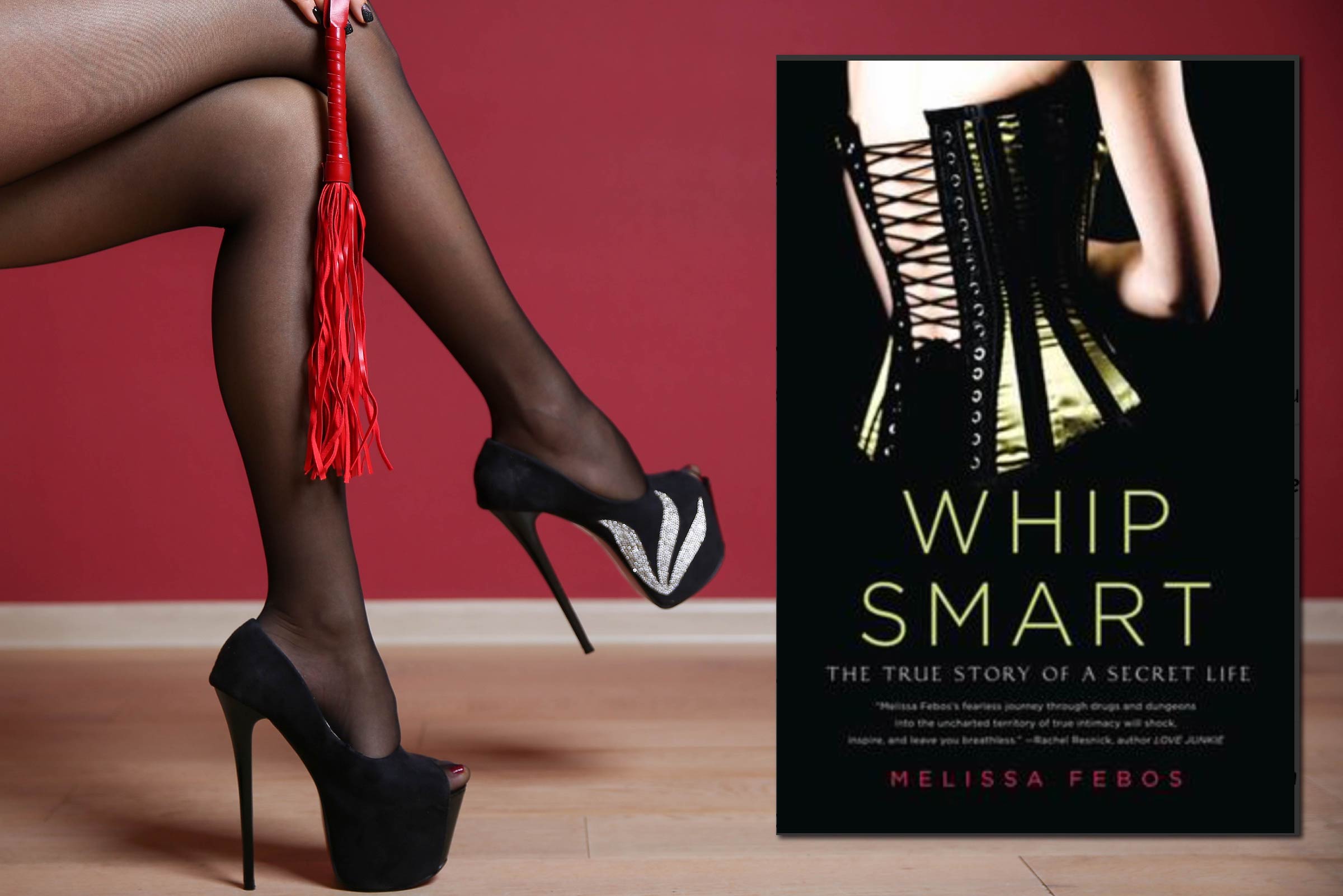What I’m Reading:

This past March, writer, and professor Melissa Febos announced her promotion to Full Professor, claiming it to be a victory for sex workers, drug addicts, and other outcasts. She tweets, “Hi, I’m a high school dropout, out & unashamed former sex worker, recovering addict, gay-married queer, & memoirist who got promoted to Full Professor today.” She nods to the fact that academia, as an institution, has its issues, but still believes that her promotion makes a powerful statement. “I hope some little queer nerd misfit addict sex worker sees this & decides that they can do it, too.” She goes on, “Or that they say, ‘boo to your establishment hierarchical nonsense!’, lol, but still think they can do whatever the fuck they want.”
I am a current sex worker and former academic—one who happens to be writing a memoir—so the attention she was getting piqued my curiosity. I picked up her 2011 sex work memoir, Whip Smart: A True Story of a Secret Life.
What I hoped to get in the memoir, based on the way she framed her “unashamed” relationship with sex work in the tweet announcement, was not what I found. To my disappointment, the book reveals someone who is deeply ashamed of her involvement in the sex industry, someone who does everything she can to distance herself from other sex workers.
Throughout the book, Febos works hard to distinguish the work she does as a dominatrix from that of other sex workers. She says, “I lived in New York, had an open mind, and needed money, but I didn’t want to strip or prostitute myself. It seemed obvious. I was surprised that I didn’t know more women who had tried it.”
The sex industry is vast, and it is perfectly understandable to be drawn to some jobs within it and not others. I’m an escort who also doesn’t want to strip because I like one-on-one interactions; I’m an introvert who isn’t good at working a room; I don’t like loud bars; and I can’t dance. I want to be in bed by 10 with a book, and stripping isn’t conducive to this goal. But to not want to strip due to personality preferences is very different than assuming that being an escort is morally superior to being a stripper. In fact, I have a lot of admiration for strippers who have honed skills that I will never have. In contrast, Febos’ use of language to describe the sort of work I do as an escort, “prostitut[ing] myself,” says a lot about how she feels about full-service sex workers. Escorts are objects, not subjects, of our own experience. Our work is something that happens to us, not something we are active participants in.
But we don’t have to make inferences based on her use of language to know where she stands. She relays a conversation with her mother about her job, saying,
“It’s been great for me, Mom. It’s given me so much confidence. I get worshiped for a living.” Instinctively, I tried to appeal to my mother’s feminist, therapist values. “The women I work with, they’re amazing, strong, educated, creative women. It’s not like I’m a prostitute or something.”
We are to gather that she doesn’t see prostitutes as “amazing, strong, educated, creative women.” Having spent a lot of time with prostitutes and strippers, I beg to differ.
This bias is more explicit later in the book when she rents a room by the hour to session with one of her clients outside the dungeon, and fears being seen as anything other than a dominatrix. “The clerk avoided my eyes and only looked at me for a brief moment, but in that moment, I knew he saw a prostitute,” she writes. She goes on:
“Maybe he noted that I was more sober or cleaner than most, but maybe he didn’t see anything beyond an image of me having sex with a big bald man behind me for money. I wanted to protest that image, but was helpless […] I had an absurd urge to show the assuming concierge my college diploma, to use vocabulary that he wouldn’t understand, to explain that I was a dominatrix, not a whore.”
A dominatrix… not a whore.
What I’m Thinking About:

There is something distasteful about Febos claiming her promotion as a victory for sex workers, when climbing the ladder of academic success included publicly stomping on sex workers who do work that she finds distasteful. Moreover, most folks who have worked in the industry for any length of time know that the boundaries between dominatrix, escort, stripper, and porn star are porous. We know that people move between these categories—that they are not as distinct as folks like to imagine.
Another former dominatrix-turned-academic, Chris Belcher, is more aware that this hierarchy (or in sex work parlance, whorearchy) is nonsense. In her 2022 memoir, Pretty Baby, she struggles to understand the distinction that Christine, one of her dominatrix colleagues, makes between themselves and escorts. In defending the legality (and therefore legitimacy) of dominatrix work, Christine says, “‘I don’t fuck my clients, though.’” Chris points out the contradiction in this and says, “’ You do fuck your clients through.’” She quips, “I couldn’t see anything “grey” about fucking a man up the ass.”
When I hear arguments like this, and I often do, I always wonder how much of the whorearchy is just a repackaging of misogyny. It is true, dominatrices fuck their clients. So why do they feel superior to escorts? Perhaps it’s that they assume escorts are the ones who are being fucked by clients, and that this somehow makes them less agentic. Back to Febos’ book, after explaining to her mom that she isn’t a prostitute, she says, “I’m in control of everything that happens. It’s empowering.”
These binaries are telling. Active/passive. Male/female. Dominant/submissive. Educated/uneducated. Empowering/degrading. It seems, then, that the real distinctions that are being made are not about whether or not sex is involved (sex in one form or another is always on the table in sex work transactions), but rather who holds the power in the dynamic. And honestly, such distinctions are flimsy at best. Just because a dominatrix flips the power script in the context of the session, doesn’t mean that she is in control (most of us have had subby clients who top from the bottom), and just because an escort is penetrated, doesn’t mean that she isn’t in charge of the dynamic (most of us have also all had clients fall for us).
In an article they wrote for Peepshow Magazine (appropriately titled Face-to-Face, Street-Based, or in Cyberspace—We Are All Prostitutes), moses moon reminds us that any attempts at whorearchial distinctions oversimplify complex, intersectional systems. They say, “Generalizing cyber-sex workers as privileged individualizes what is a complicated political struggle; it erases race, class, gender, place, and ability, in favor of reducing the debate down to non-intersectional hierarchical models of who is most and least imperiled.” The binaries simply do not work to describe something as complex as an industry that sits at the intersection of sex, money, identity, and gender. Perhaps instead of drawing these comparisons at all, we should work to hold each other up, rather than tearing each other down in order to elevate our own sense of superiority.
You can listen to an interview about Pretty Baby with Chris Belcher on the Sex Industry Book Club here.
What I’m Excited About:

As some of you know, in my other life, the one that is closely linked to this life, I’m a writer whose memoir was under contract at West Virginia University Press. I signed my contract sometime in 2021 and have been slowly working on finishing my manuscript between working, parenting, and life.
As some of you may also know, in the last several weeks, West Virginia University has received quite a lot of negative press after the provost’s announcement that he would be cutting the world language program and the MFA program, among others. As can be expected, such an announcement has drawn a lot of criticism, and led many to question what this means for higher education, particularly in the liberal arts.
As you can imagine, this has caused me a lot of stress because it has made me wonder whether they will be able to give my book the time, energy, and resources it deserves once it’s done and ready to go into production and distribution.
After a lot of thought, I have decided to pull my book and break my contract with the university press. This decision was finalized earlier this week.
This is an odd thing to put in this section given that it isn’t something I would say I’m unequivocally excited about. In fact, it was with great sadness that I made the decision. The press has been putting out some amazing books and when I signed, there was a lot of excitement about what was possible for me and my book. Leaving, in this regard, was hard. I didn’t want the person who originally signed my contract to have left the press, I don’t want the university to be seen as a warning sign to other major state universities, and I don’t want to see liberal arts programs further stripped of resources. I didn’t ask for any of this. And yet, here we are.
On the other hand, there is something almost poetic about regaining the rights to my own story, especially when that story is about leaving academia for sex work. Leaving academic institutions, in fact, is something that I am familiar with, and it is something I know I can recover from. I have done something like this before, and it has opened doors I never imagined going through. I have faith that this move will do the same.
Booking & Availability:

Buffalo, NY | Sep 8-10
Buffalo, NY | Oct 13-15
Boston, MA | Oct 26-29
Pittsburgh in between
Make sure to check out my complete travel schedule on my website.

